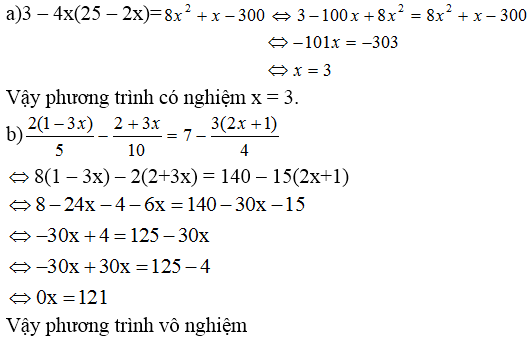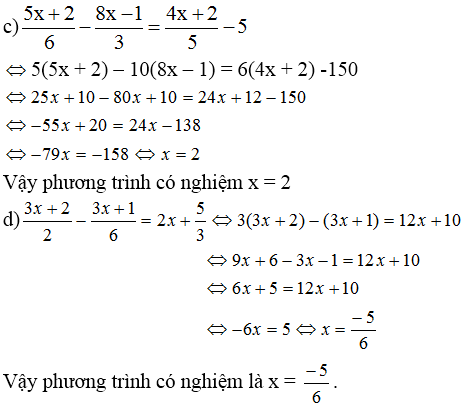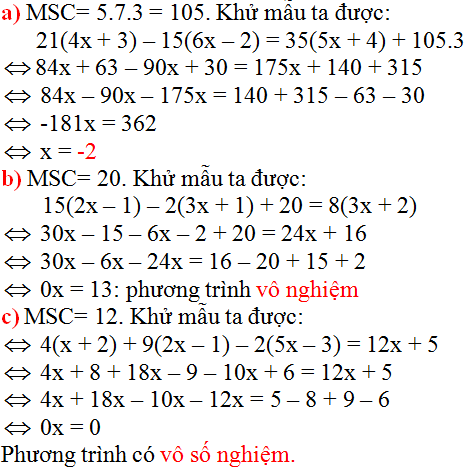Hãy nhập câu hỏi của bạn vào đây, nếu là tài khoản VIP, bạn sẽ được ưu tiên trả lời.

giải pt sau
g) 11+8x-3=5x-3+x
\(\Leftrightarrow\) 8x + 8 = 6x - 3
<=> 8x-6x = -3 - 8
<=> 2x = -11
=> x=-\(\dfrac{11}{2}\)
Vậy tập nghiệm của PT là : S={\(-\dfrac{11}{2}\)}
h)4-2x+15=9x+4-2x
<=> 19 - 2x = 7x + 4
<=> -2x - 7x = 4 - 19
<=> -9x = -15
=> x=\(\dfrac{15}{9}=\dfrac{5}{3}\)
Vậy tập nghiệm của pt là : S={\(\dfrac{5}{3}\)}
g)\(\dfrac{3x+2}{2}-\dfrac{3x+1}{6}=\dfrac{5}{3}+2x\)
<=> \(\dfrac{3\left(3x+2\right)}{6}-\dfrac{3x+1}{6}=\dfrac{5.2+6.2x}{6}\)
<=> 9x + 6 - 3x + 1 = 10 + 12x
<=> 6x + 7 = 10 + 12x
<=> 6x -12x = 10-7
<=> -6x = 3
=> x= \(-\dfrac{1}{2}\)
Vậy tập nghiệm của PT là : S={\(-\dfrac{1}{2}\)}
\(h,\dfrac{x+4}{5}-x+4=\dfrac{4x+2}{5}-5\)
<=> \(\dfrac{x+4-5\left(x+4\right)}{5}=\dfrac{4x+2-5.5}{5}\)
<=> x + 4 - 5x - 20 = 4x + 2 - 25
<=> x - 5x - 4x = 2-25-4+20
<=> -8x = -7
=> x= \(\dfrac{7}{8}\)
Vậy tập nghiệm của PT là S={\(\dfrac{7}{8}\)}
\(i,\dfrac{4x+3}{5}-\dfrac{6x-2}{7}=\dfrac{5x+4}{3}+3\)
<=> \(\dfrac{21\left(4x+3\right)}{105}\)-\(\dfrac{15\left(6x-2\right)}{105}\)=\(\dfrac{35\left(5x+4\right)+3.105}{105}\)
<=> 84x + 63 - 90x + 30 = 175x + 140 + 315
<=> 84x - 90x - 175x = 140 + 315 - 63 - 30
<=> -181x = 362
=> x = -2
Vậy tập nghiệm của PT là : S={-2}
K) \(\dfrac{5x+2}{6}-\dfrac{8x-1}{3}=\dfrac{4x+2}{5}-5\)
<=> \(\dfrac{5\left(5x+2\right)}{30}-\dfrac{10\left(8x-1\right)}{30}=\dfrac{6\left(4x+2\right)-150}{30}\)
<=> 25x + 10 - 80x - 10 = 24x + 12 - 150
<=> -55x = 24x - 138
<=> -55x - 24x = -138
=> -79x = -138
=> x=\(\dfrac{138}{79}\)
Vậy tập nghiệm của PT là S={\(\dfrac{138}{79}\)}
m) \(\dfrac{2x-1}{5}-\dfrac{x-2}{3}=\dfrac{x+7}{15}\)
<=> \(\dfrac{3\left(2x-1\right)-5\left(x-2\right)}{15}=\dfrac{x+7}{15}\)
<=> 6x - 3 - 5x + 10 = x+7
<=> x + 7 = x+7
<=> 0x = 0
=> PT vô nghiệm
Vậy S=\(\varnothing\)
n)\(\dfrac{1}{4}\left(x+3\right)=3-\dfrac{1}{2}\left(x+1\right)-\dfrac{1}{3}\left(x+2\right)\)
<=> \(\dfrac{1}{4}x+\dfrac{3}{4}=3-\dfrac{1}{2}x-\dfrac{1}{2}-\dfrac{1}{3}x-\dfrac{2}{3}\)
<=> \(\dfrac{1}{4}x+\dfrac{1}{2}x+\dfrac{1}{3}x=3-\dfrac{1}{2}-\dfrac{2}{3}-\dfrac{3}{4}\)
<=> \(\dfrac{13}{12}x=\dfrac{13}{12}\)
=> x= 1
Vậy S={1}
p) \(\dfrac{x}{3}-\dfrac{2x+1}{6}=\dfrac{x}{6}-6\)
<=> \(\dfrac{2x-2x+1}{6}=\dfrac{x-36}{6}\)
<=> 2x -2x + 1= x-36
<=> 2x-2x-x = -37
=> x = 37
Vậy S={37}
q) \(\dfrac{2+x}{5}-0,5x=\dfrac{1-2x}{4}+0,25\)
<=> \(\dfrac{4\left(2+x\right)-20.0,5x}{20}=\dfrac{5\left(1-2x\right)+20.0,25}{20}\)
<=> 8 + 4x - 10x = 5 - 10x + 5
<=> 4x-10x + 10x = 5+5-8
<=> 4x = 2
=> x= \(\dfrac{1}{2}\)
Vậy S={\(\dfrac{1}{2}\)}
g) \(11+8x-3=5x-3+x\)
\(\Leftrightarrow8+8x=6x-3\)
\(\Leftrightarrow8x-6x=-3-8\)
\(\Leftrightarrow2x=-11\)
\(\Leftrightarrow x=-\dfrac{11}{2}\)
h, \(4-2x+15=9x+4-2x\)
\(\Leftrightarrow-2x-9x+2x=4-4-15\)
\(\Leftrightarrow-9x=-15\)
\(\Leftrightarrow x=\dfrac{-15}{-9}=\dfrac{5}{3}\)

a: \(\Leftrightarrow-12x-4=8x-2-8-6x\)
=>-12x-4=2x-10
=>-14x=-6
hay x=3/7
b: \(\Leftrightarrow3\left(5x-3\right)-2\left(5x-1\right)=-4\)
=>15x-9-10x+2=-4
=>5x-7=-4
=>5x=3
hay x=3/5(loại)
c: \(\Leftrightarrow x^2-4+3x+3=3+x^2-x-2\)
\(\Leftrightarrow x^2+3x-1=x^2-x+1\)
=>4x=2
hay x=1/2(nhận)

a: =>5-x+6=12-8x
=>-x+11=12-8x
=>7x=1
hay x=1/7
b: \(\dfrac{3x+2}{2}-\dfrac{3x+1}{6}=2x+\dfrac{5}{3}\)
\(\Leftrightarrow9x+6-3x-1=12x+10\)
=>12x+10=6x+5
=>6x=-5
hay x=-5/6
d: =>(x-2)(x-3)=0
=>x=2 hoặc x=3

Mấy này bạn quy đồng lên cùng mẫu xong khử mẫu rồi giải. Dễ mà.

a. \(\dfrac{5x+2}{6}-\dfrac{8x-1}{3}=\dfrac{4x+2}{5}-5\)
<=> \(5\left(5x+2\right)-10\left(8x-1\right)=6\left(4x+2\right)-6\cdot5\)
<=> \(25x+10-80x+10=24x+12-30\)
<=> \(25x-80x-24x=12-30-10-10\)
<=> \(-79x=-38\)
<=> \(x=\dfrac{-38}{-79}\)
\(x=\dfrac{38}{79}\)
b. \(x-\dfrac{2x-5}{5}+\dfrac{x+8}{6}=7+\dfrac{x-1}{3}\)
<=> \(30\cdot x-6\left(2x-5\right)+5\left(x+8\right)=30\cdot7+10\left(x-1\right)\)
<=> \(30x-12x+30+5x+40=210+10x-10\)
<=> \(30x-12x+5x-10x=210-10-30-40\)
<=> \(13x=130\)
<=> \(x=\dfrac{130}{13}\)
\(x=10\)
c. \(\dfrac{x+1}{15}+\dfrac{x+2}{7}+\dfrac{x+4}{4}+6=0\)
<=> \(28\left(x+1\right)+60\left(x+2\right)+105\left(x+4\right)+420\cdot6=0\)
<=> \(28x+28+60x+120+105x+420+2520=0\)
<=> \(28x+60x+105x=-28-120-420-2520\)
<=> \(193x=-3088\)
<=> \(x=\dfrac{-3088}{193}\)
\(x=-16\)
d. \(\dfrac{x-342}{15}+\dfrac{x-323}{17}+\dfrac{x-300}{19}+\dfrac{x-273}{21}=10\)
<=> \(6783\left(x-342\right)+5985\left(x-323\right)+5355\left(x-300\right)+4845\left(x-273\right)=101745\cdot10\)
<=> \(6783x-2319786+5985x-1933155+5355x-1606500+4845x-1322685=1017450\)
<=> \(6783x+5985x+5355x+4845x=1017450+2319786+1933155+1606500+1322685\)
<=> \(22968x=8199576\)
<=> \(x=\dfrac{8199576}{22968}\)
\(x=357\)





a, Ta có : \(\dfrac{2x-1}{5}-\dfrac{x-2}{3}=\dfrac{x+7}{15}\)
=> \(\dfrac{3\left(2x-1\right)-5\left(x-2\right)}{15}=\dfrac{x+7}{15}\)
=> \(\dfrac{6x-3-5x+10}{15}=\dfrac{x+7}{15}\)
=>\(\dfrac{x+7}{15}=\dfrac{x+7}{15}\)
Vậy phương trình thỏa mãn với mọi x
b, Ta có :\(\dfrac{5x+2}{6}-\dfrac{8x-1}{3}=\dfrac{4x+2}{5}-5\)
=>\(\dfrac{5x+2-2\left(8x+1\right)}{6}=\dfrac{4x+2-25}{5}\)
=>\(\dfrac{5x+2-16x+2}{6}=\dfrac{4x-23}{5}\)
=>\(\dfrac{-11x+4}{6}=\dfrac{4x-23}{5}\)
=> 6(4x-23)= 5(-11x+4) => 24x-138=-55x+20 => 79x =158 =x=2
Vậy x=2